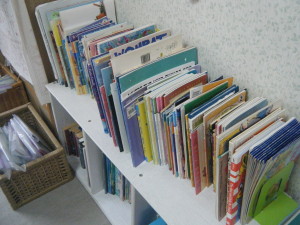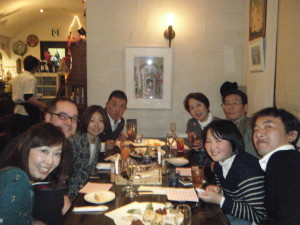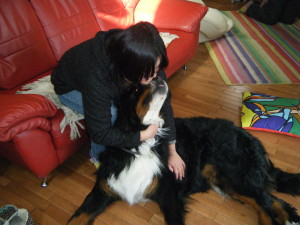The power of stories
– Chiyuki Yanase
Storytelling, storytelling, storytelling! Wherever we go, whenever and whoever we meet, that’s what we do. We tell stories to each other. Some of us are better at the telling than others. Despite the quality or quantity of the story, everyone has got something to tell. Once I become aware of this human tendency, every day has been filled of lines of storytelling events and I love that change. Some stories are heartwarming. Some are heart-wrecking. Some are heartbreaking. Whatever the story is, it inspires or provokes powerful emotions, which makes me feel alive and thankful for the hearts that bring to me all kind of colors of human sentiments.
This sensitiveness in my heart, I suspect, must have been nurtured by numerous stories that I heard in my childhood. I had such a huge family compared to the modern nuclear one. My family included my grandparents, my parents, two uncles, two aunts, two cousins, two younger brothers and a helper of the family. In total 14 including myself. What a noisy household it was, especially at meal times when everyone gathered at the table trying to get what we wanted to eat while sharing our stories of the day. In addition to those personal narratives, my mum never failed to read bedtime stories for her children — my brothers and me. My grandpa often said to her, “If you hadn’t bought those books, you could have built a house!” My mum smiled and said, “I have all kinds of houses in all kinds of countries. I can do it because of those books I have read. Books can give my children a powerful force called imagination. Nobody can take that from them.” My grandparents shook their heads as if she was a silly person and was speaking nonsense. But her children didn’t mind at all whether she was silly or not because we all loved her bedtime stories.
In addition to those daily personal narratives and bedtime stories we heard from our family, my grandma’s massive number of friends showered us with more stories about their lives. There was never a day without having a few guests at home. They visited us, had lunch and went home, leaving their stories ringing in our ears. Some stories were beyond our comprehension but I remember the sensations that went through my spine whenever someone told us one of those stories about the storytellers’ dreams.
The other night, my mother said in my dream, “Stay away from trouble.” I think she meant that I shouldn’t get involved with the troubles of one of my friends. Perhaps she is involved in something more serious than I can imagine. My mother looked really worried. I think I should take her advice and won’t get involved with the matter.
In such cases, my grandma and her other friends usually nodded and said, “You’d better listen to your mother!” Then they moved on to the next story after a few seconds of pensive silence. The ambiguity of language that is part of the art of Japanese storytelling was way beyond children’s capability to decode. However, I thought to myself one day I would understand those stories like my grandma and her counterparts and would join them as I nodded slowly and deeply like them. Thanks to all the fantastic storytellers, my childhood was filled with numerous forms of stories told by various generations of people. Naturally, I became a big fan of personal narratives and children’s literature.
My love of stories continues today. It is one of the influences or inspirations that defines me as a person and is the most powerful force to get me to stay in the business of teaching English for young learners. In my view, stories are vehicles to take us to the world of narratives where you can be as free as you want to be. This kind of freedom in mind can empower children and help them to develop their imagination, creativity, empathy, morals and curiosity towards other fellow beings in reality. Such healthy curiosity towards lives of other human beings is one of unique characteristics of our race. This uniqueness can be the force to bring whatever innovations are needed to bring progress to the history of the human race. In comparison to other species on this planet, the human race can be the most destructive one. However, we can also be innovative and productive in many ways. To me, weaving stories with others to share is one of these ways. – Chiyuki Yanase
Connect with Chiyuki and other iTDi Associates, Mentors, and Faculty by joining iTDi Community. Sign Up For A Free iTDI Account to create your profile and get immediate access to our social forums and trial lessons from our English For Teachers and Teacher Development Courses.





Dear Chiyuki,
Thank you so much for sharing such lovely memories. As I read your story I could imagine you, all the people talking, and the stories floating in the air in your childhood. I am happy that stories have marked you so much, as I also carry many cherished storytelling memories in my essence. My grandma used to tell me fantastic stories that have certainly contributed in my upbringing and in my choice of becoming a language teacher.
I am looking forward to meeting you in October. We will certainly have lots of stories to share!
Stories, stories, let them come, let them go…
Juan
I am Indonesian man… I have a question mom. what is the differentiate between storytelling and tellingstory?
Thank you so much for your question. I owe you my deepest apology for such a delayed reply. Today is my last working day and got some time to think about the good question of yours. The differences between storytelling and telling stories might be the familiarity and the structure of a teller who holds the event. Telling stories are daily events. The stories are spontaneous and not planned by the teller. However, Storytelling event requires a little planning and certain skills for a teller for it usually have some audience who expect the teller comparatively high standard of telling technics such as using non-verbal communication tools (eg. facial expressions).
I hope my comments answer your question to a certain degree.